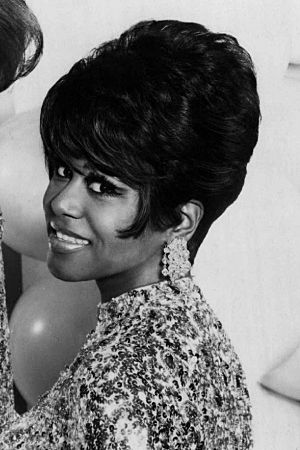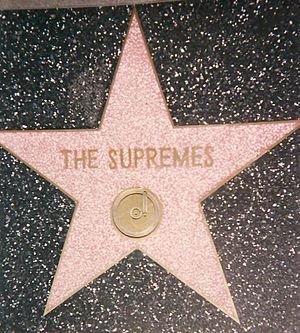Cindy Birdsong facts for kids
Quick facts for kids
Cindy Birdsong
|
|
|---|---|

Birdsong in 1967
|
|
| Born |
Cynthia Ann Birdsong
December 15, 1939 Mount Holly, New Jersey, U.S.
|
| Years active | 1960–1979 1987–2011 |
| Spouse(s) |
Charles Hewlett
(m. 1970; div. 1975) |
| Children | 1 |
| Musical career | |
| Origin | Philadelphia, Pennsylvania, U.S. |
| Genres | |
| Occupations |
|
| Instruments | Vocals |
| Labels | Hi-Hat Records |
Cynthia Ann Birdsong, born on December 15, 1939, is an American singer. She became well-known in 1967 when she joined the Supremes, a very famous music group. She took the place of Florence Ballard, one of the group's original members. Before joining The Supremes, Birdsong was part of another group called Patti LaBelle & The Bluebelles.
Cindy Birdsong's Life Story
Early Years
Cindy Birdsong was born in Mount Holly, New Jersey, on December 15, 1939. She was the oldest child of Lloyd Green Birdsong Sr. and Annie Birdsong. She spent some of her childhood in Philadelphia before her family moved back to New Jersey, settling in Camden. Cindy dreamed of becoming a nurse and planned to go to college in Pennsylvania.
In 1960, when she returned to Philadelphia, a friend named Patsy Holte asked her to join her singing group, The Ordettes. Cindy was 20 years old, making her the oldest member of the group. The other members were still in their mid-teens.
Singing with Patti LaBelle and The Bluebelles
By 1962, two new members, Sarah Dash and Nona Hendryx, joined the group. They had sung together in another group that had stopped performing. That same year, they tried out for Harold Robinson, a local record label owner. Robinson decided to work with them after hearing Patti LaBelle sing "I Sold My Heart to the Junkman".
Soon after, Robinson signed them. They recorded as the Blue Belles and helped promote the song "I Sold My Heart to the Junkman". This song had originally been recorded by another group, The Starlets. After some legal issues, Robinson changed the group's name to "Patti LaBelle and The Blue Belles".
In 1963, the group had their first hit song with "Down the Aisle". Later that year, they recorded their version of "You'll Never Walk Alone". This song became another hit for them in 1964. They also had a charted song called "Danny Boy".
In 1965, the group signed with Atlantic Records. They released several singles, including "All or Nothing" and "Take Me for a Little While". They also recorded their own versions of "Over the Rainbow" and "Groovy Kind of Love".
Joining Diana Ross & The Supremes (1967–1970)
In April 1967, Berry Gordy, the head of Motown Records, contacted Cindy Birdsong. He was looking for someone to replace Florence Ballard in The Supremes. Diana Ross, the lead singer, wanted a change because of Ballard's behavior.
Cindy shared her experience: "I was told they wanted me there. Motown executives met me at the airport and drove me to Berry Gordy's house. The group was having a meeting with him. I was still with Patti's group and didn't even tell her I was going to Detroit. The door opened, and Florence came out crying with her mother. She was so upset she didn't even see me. That's when I realized I was there to replace her. I felt bad, but Florence later understood."
Cindy began practicing with The Supremes, learning Florence's parts. When Florence Ballard was no longer with the group in July 1967, Cindy officially became a member during a show in Las Vegas.
During her time with Diana Ross & The Supremes, other singers often provided background vocals for Ross. However, when their song "Someday We'll Be Together" became a number one hit, the group made their last TV appearance with Ross. They performed on The Ed Sullivan Show on December 21, 1969.
The "New" Supremes (1970–1972; 1973–1976)
In 1970, Jean Terrell became the new lead singer of The Supremes, replacing Diana Ross. In this new group, Cindy Birdsong's and Mary Wilson's voices were heard more often. The group also recorded three albums with The Four Tops. They had a hit song with The Four Tops, a cover of "River Deep – Mountain High".
The Supremes continued to have success in the early 1970s. They had hits in the United Kingdom and several pop and soul hits in the United States. .....
Cindy Birdsong left the group for a while to have her first child. Lynda Laurence took her place. Cindy returned to the group in 1973, replacing Lynda Laurence, who also left to start a family. Around this time, Scherrie Payne also joined the group, replacing Jean Terrell. Cindy sang on two albums during this period: The Supremes (1975) and High Energy (1976). Cindy left The Supremes in February 1976.
Later Career and Reunions
After leaving The Supremes, Cindy Birdsong worked as a nurse at Ronald Reagan UCLA Medical Center. She also worked for Suzanne de Passe at Motown Records.
In 1983, Cindy reunited with former Supremes members Mary Wilson and Diana Ross for a special TV show called Motown 25. This show celebrated Motown's anniversary. In 1986, she joined a group called the Former Ladies of the Supremes with Jean Terrell and Scherrie Payne. However, she left to try a solo music career and was replaced by Lynda Laurence again. She briefly recorded a single called "Dancing Room" for Hi–Hat Records.
In 1999, she reunited with The Bluebelles, who had changed their name to Labelle after Cindy left. This was their first reunion in 32 years. The group received an R&B Foundation Award for Lifetime Achievement and sang "You'll Never Walk Alone" together. In 2004, Cindy joined Mary Wilson and Kelly Rowland (from Destiny's Child) to perform a mix of Supremes hits for the Motown 45 anniversary TV special.
Personal Life
Cindy Birdsong married Charles Hewlett in August 1970 in San Francisco. Her singing partners, Jean Terrell and Mary Wilson, were there. This was Cindy's first marriage. She filed for divorce in March 1975. They have one son, Charles, who is known as David.
In recent years, Cindy Birdsong's health has been a topic of public discussion. Her family has shared that she has experienced several strokes. In October 2023, a judge decided that her family would be in charge of her care. In April 2024, a follow-up article mentioned that her son, David, filed a lawsuit related to her care.
A Difficult Experience
In December 1969, Cindy Birdsong had a frightening experience. While returning to her Los Angeles apartment with her boyfriend and a friend, an intruder entered. The person forced Cindy to tie up her companions, then made her go downstairs and into her car at knifepoint. Cindy bravely managed to unlock the car door while the person was driving. She jumped out of the moving car onto the Long Beach Freeway to safety. She was taken to the hospital for her injuries. Days later, the person responsible, Charles Collier, turned himself in to the police. In April of the next year, he was held responsible for his actions.
Music Recordings
Patti LaBelle & The Bluebelles
Albums
- 1963: Sweethearts of the Apollo
- 1963: Sleigh Bells, Jingle Bells & Bluebells
- 1965: On Stage
- 1966: Over the Rainbow
- 1967: Dreamer
Singles
- 1962: "I Sold My Heart to the Junkman"
- 1962: "I Found a New Love"
- 1962: "Tear After Tear"
- 1963: "Cool Water"
- 1963: "Decatur Street"
- 1963: "Down the Aisle (The Wedding Song)"
- 1964: "You'll Never Walk Alone"
- 1964: "One Phone Call (Will Do)"
- 1964: "Danny Boy"
- 1965: "All or Nothing"
- 1966: "Over the Rainbow"
- 1966: "Ebb Tide"
- 1966: "I'm Still Waiting"
- 1966: "Take Me for a Little While"
- 1967: "Always Something There to Remind Me"
- 1967: "Dreamer"
- 1967: "Oh My Love"
Diana Ross & The Supremes
Albums
- 1968: Reflections
- 1968: Live at London's Talk of the Town
- 1968: Diana Ross & The Supremes Sing and Perform "Funny Girl"
- 1968: Diana Ross & The Supremes Join The Temptations (with The Temptations)
- 1968: Love Child
- 1968: TCB (with The Temptations)
- 1969: Let the Sunshine In
- 1969: Together (with The Temptations)
- 1969: Cream of the Crop
- 1969: G.I.T. on Broadway (with The Temptations)
- 1970: Farewell
Singles
(All singles with The Temptations)
- 1968: "I'm Gonna Make You Love Me"
- 1969: "I'll Try Something New"
- 1969: "The Weight"
- 1969: "I Second That Emotion"
- 1970: "Why (Must We Fall in Love)"
The Supremes
Albums
- 1970: Right On
- 1970: The Magnificent 7 (with The Four Tops)
- 1970: New Ways but Love Stays
- 1971: The Return of the Magnificent Seven (with The Four Tops)
- 1971: Touch
- 1971: Dynamite (with The Four Tops)
- 1972: Floy Joy
- 1975: The Supremes
- 1976: High Energy
Singles
- 1970: "Up the Ladder to the Roof"
- 1970: "Everybody's Got the Right to Love"
- 1970: "River Deep – Mountain High" (with The Four Tops)
- 1971: "Nathan Jones"
- 1971: "You Gotta Have Love in Your Heart" (with The Four Tops)
- 1971: "Touch"
- 1971: "Floy Joy"
- 1972: "Automatically Sunshine"
- 1972: "Without the One You Love" (with The Four Tops)
- 1972: "Your Wonderful, Sweet Sweet Love"
- 1975: "He's My Man"
- 1975: "Where Do I Go from Here"
- 1975: "Early Morning Love"
- 1976: "I'm Gonna Let My Heart Do the Walking"
- 1976: "High Energy"
Solo
Singles
- 1987: "Dancing Room"
 | Tommie Smith |
 | Simone Manuel |
 | Shani Davis |
 | Simone Biles |
 | Alice Coachman |


